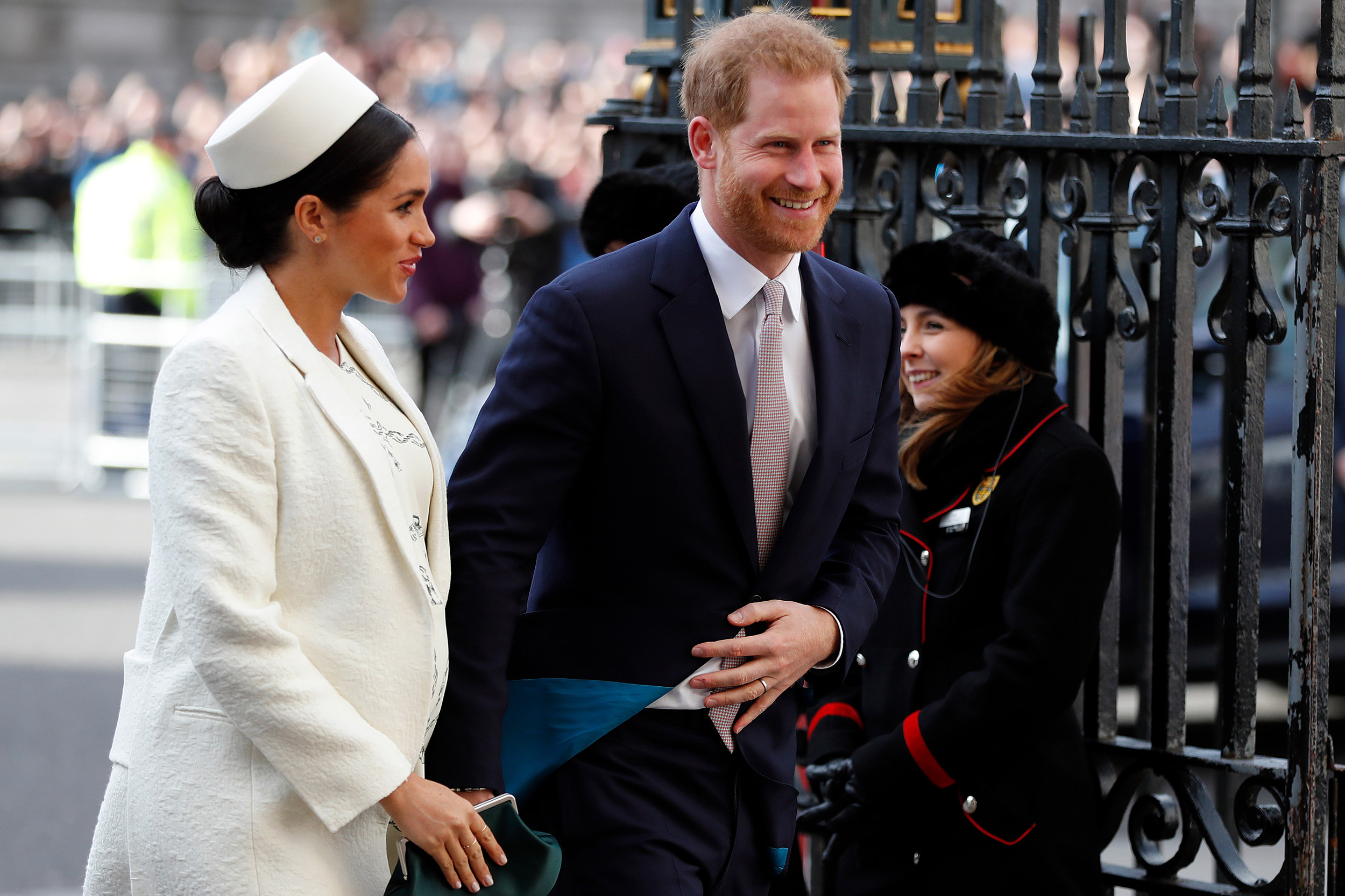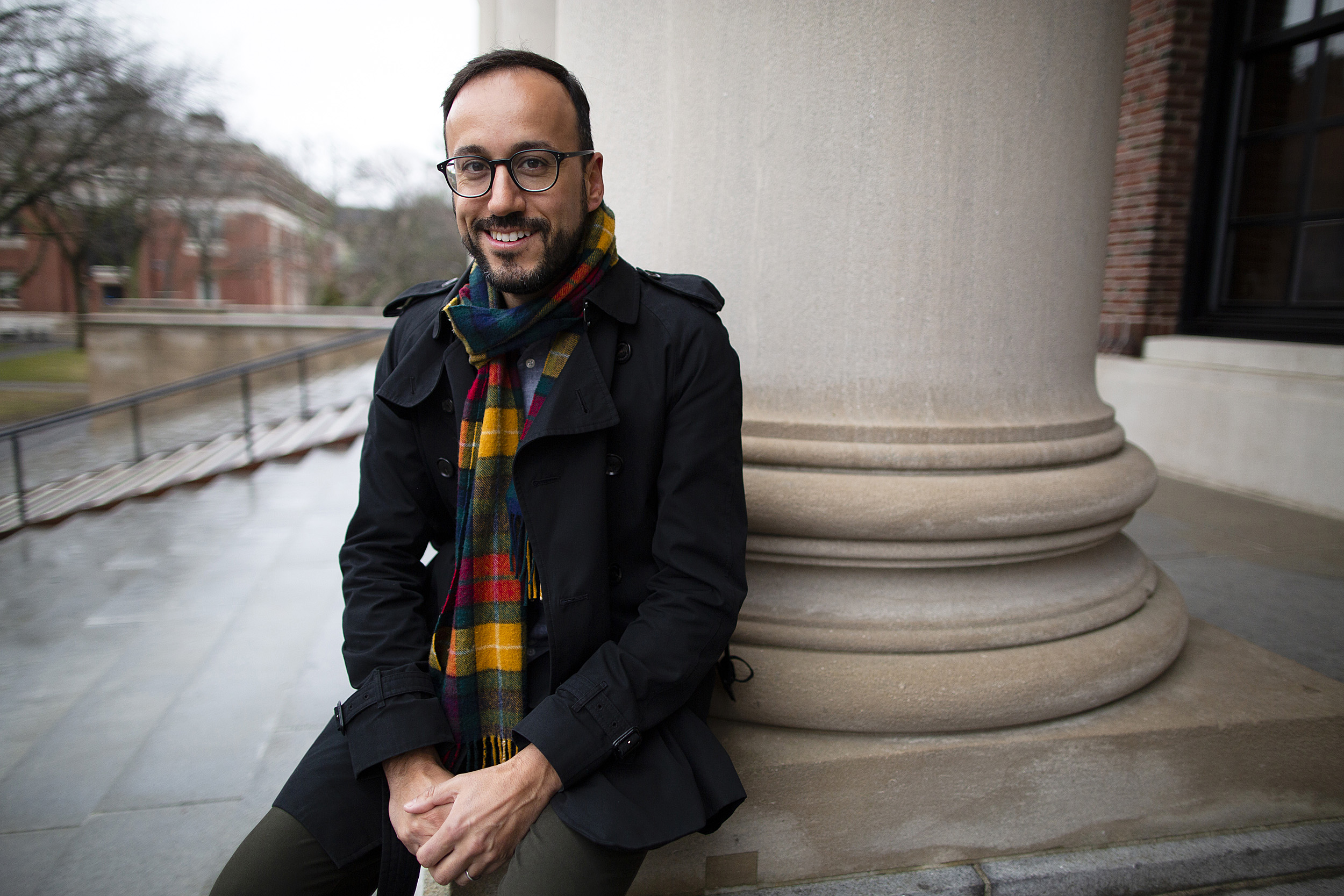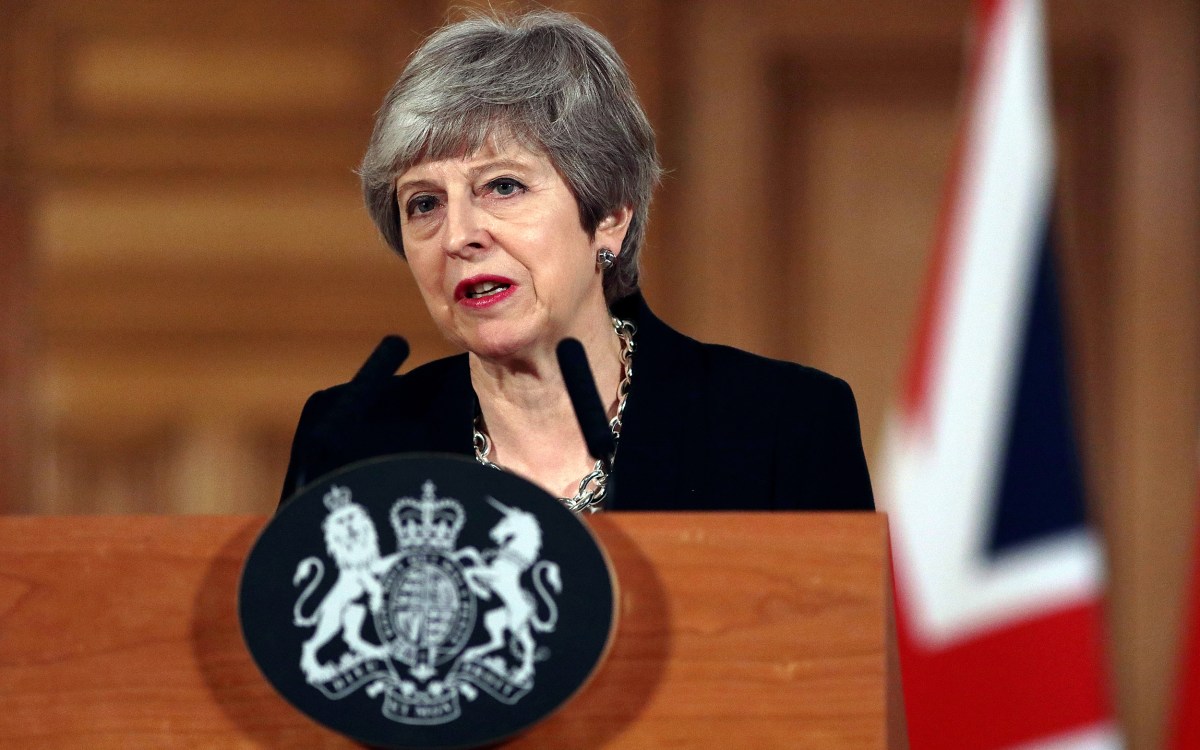
Britain’s Prince Harry and Meghan, the Duchess of Sussex, live in the media spotlight, a place Harry and his brother, William, have navigated since birth.
AP Photo/Frank Augstein
‘The same in private as they are in public’
Shorenstein Fellow Miguel Head, chief of staff and press secretary for princes William and Harry for a decade, discusses his likable bosses and their relationship to the media
Prince Harry and his wife, Meghan, the Duchess of Sussex, will welcome the birth of their first child any day now. And perhaps other than the royal couple and their medical team, few are awaiting the event more breathlessly than the British press. From tabloids and gossip mags to the BBC and The Guardian, all are on Baby Sussex Watch. Even here in the U.S., where the couple’s star-studded wedding last May drew nearly 30 million viewers, twice that of Prince Charles and Lady Diana’s 1981 nuptials, outlets from “Entertainment Tonight” to The New York Times are busy keeping everyone up to date on the latest news about the baby’s arrival.
Few have experienced a media crush like the one that follows Prince Harry and his older brother, Prince William, wherever they go, much less wrangled one. Miguel Head certainly has.
For the past decade, Head has worked for the British royal family, starting as the first press secretary to Prince William and Prince Harry and then rising to become Prince William’s private secretary in 2012. A trusted adviser, he held the senior management position in the Duke and Duchess of Cambridge’s household and also oversaw the prince’s engagement diary and accompanied him on overseas trips.
Head stepped down last May after reaching a decade of service. He is now a spring fellow at the Shorenstein Center for Media, Politics and Public Policy at Harvard Kennedy School studying the role that the British press played during the 2008 financial crisis, which fomented citizen anger and resentment at the state that remains today.
The Gazette spoke with Head about working for the royal family, the complicated relationship between the princes and the British press, and how public attitudes toward the British royal family have shifted in recent years.
Q&A
Miguel Head
GAZETTE: How does one get a job as a trusted adviser to British royalty?
HEAD: I ended up working for the royal family by being in the right place at the right time, really. I was the chief press officer at the U.K. Ministry of Defense around the time Prince Harry went to Afghanistan. He went twice, but the first time, he went under a media blackout, which the Ministry of Defense negotiated with the British media and a lot of American mainstream media as well. We got him there for 10 weeks; we expected it would be a lot shorter. Eventually, [the blackout] was broken online, and so we had to pull him out. But that was viewed as a success.
Shortly afterward, the two princes, who had previously used their father’s team but were now in their early 20s and wanted a bit more independence, asked for their own press secretary. And to be honest, I think the only one that they’d ever come across outside the household was me [laughs], so I got moved across. It was a dream come true; it was a dream I didn’t know I even had, but it was a wonderful moment.
GAZETTE: Given how famous the princes are and the ultra-competitive nature of the British press, what was the job like? Were you constantly pushing off requests for their time and striving to contain negative stories?
HEAD: The royal family is one of the most well-known institutions in the world and the two young princes always have been very popular and well-regarded and sources of great interest and intrigue over the years. I suppose the way that we dealt with it was really directed by them. They had a very healthy attitude to a lot of what was written about them, which is that they largely just completely ignored it. So, our rule of thumb was we only commented reactively on stories if the stories were judged, in our view, to have a detrimental reputational impact. And the bar for that was quite high. The princes took the view that they were going to be in the public eye from the moment they were born to the moment they died and with that level of interest in them, the only way of coping with that would be to detach themselves from much of what is said about them. It was actually quite liberating, because it meant that we as a team could concentrate on what we wanted to say about them. In essence, what we were trying to do was focus the interest in them on particular aspects of their public life, of their work in their early 20s as they were beginning to find their feet and experimenting with different topics, different careers. They were both in the armed forces for a period of time. Prince William was the first in the line of succession to work for a private organization, which he did for about two-and-a-half years as an air ambulance pilot. So we had lots of things to say about them.
I have to say, the job was very easy because the two princes were delightful to work for. They are the same in private as they are in public, very popular, and they have a genuineness about them, a compassion about them which people relate to and respond to. Very seldomly did we ever felt like we were fighting a rear guard.
Miguel Head, former press secretary for Prince William and Prince Harry and now a spring Shorenstein Center Fellow, talks about his former role.
Stephanie Mitchell/Harvard Staff Photographer

GAZETTE: Why did you decide to leave?
HEAD: If you’re working for the royal family in the kind of work that I was doing, you feel like you’re on call 24/7. That’s the nature of the work. It is also one of the reasons why the royal family has a very strong tradition, which is if you’re in a senior position, you don’t do more than 10 years. It’s partly because it’s such an intense role that after that period of time, you’ve probably lost your perspective and you’re not so useful to them. It’s harder to say no and it’s harder to challenge and it’s harder to give different perspectives on what’s going on because it’s a bubble and after 10 years, you are firmly part of that bubble. So, after 10 years you leave, which is why I left.
GAZETTE: What was the attitude of the princes toward the press and the dynamic between the two, especially given how their lives were irrevocably altered by paparazzi?
HEAD: They’re incredibly close as brothers, but they’re very different as people and that’s been reflected in the way the media have covered them. Their relationship with the media has been shaped by what happened to them in their childhood.
Prince William is a great consumer of news and current affairs and therefore has a respect for news and the importance of good journalism, and he has always maintained that respect through the time I’ve known him. The way he used to articulate that respect in private was to encourage the media to be the best versions of themselves. He felt that the competitive nature of the British press leads them to be excellent on a world stage, to produce some of the best journalism and journalists in the world, but it leads them to conduct some great excesses, as well. The way in which his parents, particularly his mother, was treated. The way in which, of course, she died.
Prince Harry was younger when his mother died and, by his own admission, that has taken him longer to process in a different way. He has a similar view of the media to Prince William in that he believes that freedom of the press is very important. But he has always found the personal relationship harder. He always wears his emotions on his sleeve. You know how Prince Harry’s feeling and that’s one of the great qualities about him, which people respond to.
On a personal level, he gets on very well with lots of journalists. When he was dating Meghan Markle, now the Duchess of Sussex, there was a lot of interest in her. He felt very early on that he must lay down a red line about how she is treated by the press — not what the press says about her, the princes know that they can never control that, but just how in terms of how paparazzi photographers behaved around her. He laid down lines very early on in the relationship, which is quite unusual. Prince William waited a lot longer before he set out similar lines around then Kate Middleton.
When they were in their early 20s, the two princes were the first to be identified and take action on a scandal known as phone hacking. They were the first to realize it was happening to them. The police took action on their behalf and two people were jailed for it. The princes were very hurt by that because they had rather hoped that the excesses of intrusion into privacy that had ultimately led Diana, Princess of Wales, to be chased down a tunnel, which led to her death, would have calmed over the years and that they would be treated with a little bit more respect — not respect because of their position, but respect through dint of their humanity, of knowing what happens to people who are intruded [on] at that level. The phone-hacking scandal was a real blow to their trust in the mainstream media.
GAZETTE: Have you seen changes in the way issues like inequality, race and cultural diversity are talked about and covered by the British press in the past 10 years?
HEAD: For sure. Of course, British newspapers are not immune to what’s happened to newspapers in America and elsewhere. Advertising revenues have plummeted, readership has plummeted. It’s the same debates that are happening here. What is also difficult for newspapers is to cover the kind of issues — social inequality, race — long-term social issues which by their nature don’t lend themselves easily to news stories. British newspapers find that particularly difficult to cover because they’re all London-based; they have very few journalists now who work for them outside of London. Local newspapers have shut, agencies have shut that traditionally used to feed them stories, so it’s harder for London-based national newspapers to have a genuine feel for what’s going on in the country.
One of the things I’m doing here at Harvard is looking at anger around the financial crisis of 2007‒2008. Did the anger about that get missed by the British press, who reported on it for a year or two and then moved on to other things, whilst a lot of the public didn’t move on? British newspapers, as they’ve had to cut costs, they’ve become more and more bunkered into London and that makes them more unresponsive to these big changes that are happening in the country. Which, in turn, leads people outside of London to feel they’re not part of the national story anymore, except as crime or sports stories. There are lots of people who didn’t feel they were part of that story — economically, politically, socially, culturally — led by a kind of London elite, and that causes a lot of resentment and anger. I totally understand that. I think the anger and resentment is actually quite justified.
“The job was very easy because the two princes were delightful to work for. They are the same in private as they are in public, very popular, and they have a genuineness about them, a compassion about them which people relate to and respond to. Very seldomly did we ever felt like we were fighting a rear guard.”
Miguel Head
GAZETTE: Particularly with the marriages to women outside British aristocracy, are the princes making an effort to narrow the social distance between royals and citizens, or with Harry, to lead on certain social issues? Is that accurate and how are people responding to it?
HEAD: It is accurate, but it’s accurate not through strategy or grand design. The royal family doesn’t have a formal strategy or job description. It does what it does through a set of values that it holds true to itself. Those values have been set by the queen, of course, and her remarkably successful reign. And one of those that the queen puts a lot of store by is that the royal family are there for what we used to describe as being in “the happiness business.”
We’re there to celebrate success and to put a spotlight on people who have done great things. That can be as a caregiver or someone’s who campaigned for a sports hall in their town or it can be a Nobel Prize laureate. It can be anything in between all of those things. The royal family takes great delight and spends a lot of time searching out those things to celebrate them. It’s probably the biggest guide for when we were looking how to fill the program, that was the thing by which we operated.
The second thing the royal family does which I was really impressed by when I started to work there, was that all of them, from the youngest to the oldest, put great store in public service being an important end in itself. Even if that public service hasn’t resulted in anything that’s worth crowing about, just the fact of its being done is something that should be celebrated and recognized. It’s one of the reasons the royal family has always had a very warm relationship with politicians of such different political hues, from very conservative through to left-wing and socialist. Politicians and public-sector workers are doing what they do out of a sense of public duty, a sense of sacrifice, and I really appreciated that being an ex-civil servant myself. That’s almost in the DNA of the family.
GAZETTE: Royal weddings are always popular, but the tradition-shattering wedding of Prince Harry and Meghan Markle felt very fresh and modern in part because of how the couple’s very different backgrounds seemed equally represented. Was that event and the positive public reaction to it a watershed moment in Britain in terms of diversity and inclusion?
HEAD: I don’t know if it was a watershed moment. What was interesting about it was the way the engagement and marriage was met with genuine happiness and respect from the public and public leaders in Britain and the Commonwealth and in America, as well. Which I think says something about the way in which society is much more relaxed about those issues than it might have been. The fact that Ms. Markle was divorced would have been very problematic 50, 60 years ago. The queen’s sister, famously, couldn’t marry the man she originally wanted to marry [for that reason]. All of those things have moved on in society and I suppose because the two princes, in particular Prince Harry, have a reputation for being who they are. The public really respected that he is very much in love with his wife and he wanted to marry her, and the fact that she was American and an actress and African American and already once married, all those “issues” were suddenly not issues anymore because something else is more important. I’m personally very fond of Prince Harry. For all of us, we were just immensely thrilled that he had met someone who was so obviously good for him, and the two of them are a great couple. Just a very happy moment.
One of the things that has been very healthy about the way in which the royal family has remained so popular and respected and loved in the U.K. is it has been very successful, again through no strategy, very successful at being true to the generation in which it belongs. That the two young princes married people who they quite obviously chose themselves — there was no pressure for them to marry who they married — and had the types of weddings that they had, and have conducted their public lives and private lives in the way that they have, feels very in the grain of society at large.
Our royal family is not an imperial family which has to be removed from everyday life. It’s important the royal family retains a sense of magic and mystery. I think that’s a very important part of what the royal family represents — a sense of the eternal, a sense of values that are timeless. I don’t think that should ever be lost. But that doesn’t mean to say that individual members can’t have a relationship with society that changes over time. I’ve no doubt that Prince William’s own children will have a different kind of relationship with society, not least thanks to social media. They’ll grow up with that. The royal family is never a static institution; it doesn’t have set rules that it must follow forever. It is, instead, guided by a set of principles, which each generation can interpret in their own way.
This interview has been edited for clarity and length.






